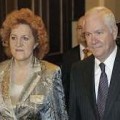Secretary Gates says during a joint visit to Moscow earlier this month he and Secretary of State Condoleezza Rice told Russian officials the United States will not slow the negotiations for the sites or their construction. But he says the United States might be willing leave the sites unused, at least for a while.
Czech Defence Minister Vlasta Parkanova, left, her US counterpart Robert Gates, right, in Prague, 23 Oct 2007 Czech Defense Minister Vlasta Parkanova, left, her US counterpart Robert Gates, right, in Prague, 23 Oct 2007 "We would consider tying together the activation of the sites in Poland and the Czech Republic with definitive proof of the threat, in other words, Iranian missile testing and so on," he said. Pentagon Press Secretary Geoff Morrell later said if Russia agrees to the delay proposal, the United States would retain the right to activate the system at any time based on its own assessment of Iran's missile capability. Russia says Iran is 15-20 years away from having long-range missiles, while U.S. officials believe the threat is only a few years away.
The U.S. proposals are aimed at ending Russian opposition to extending the U.S. missile-defense system into Europe with a radar installation in the Czech Republic and an anti-missile launch site in Poland. The United States says the system is needed to protect NATO allies and U.S. military facilities from a missile attack by Iran, and could also benefit Russia.
But Russia considers the system a challenge to its own capabilities.
Secretary Gates also said he and Secretary Rice asked the Russians if increased transparency about the purpose and operations of the anti-missile system might ease their concerns, perhaps including sending Russian observers the sites. He said he discussed that with Czech officials on Tuesday.
Secretary Gates and Czech Defense Minister Vlasta Parkanova review an honor guard in Prague, 23 Oct 2007 Secretary Gates and Czech Defense Minister Vlasta Parkanova review an honor guard in Prague, 23 Oct 2007 "I also made clear in my conversations this morning that if we were to explore measures of transparency with the Russians such as having a presence here in the Czech Republic or in Poland at these sites, that we would carry these proposals first to the Czech government, and that nothing would be done without the consent of the Czech government," he said. Asked whether the Czech government would accept such a Russian presence, Prime Minister Mirek Topolanek said: "No comment. Thank you." Morrell says Czech officials did not express any objection to the U.S. idea. He also says Secretary Gates understands it could be difficult for the Czechs to accept Russian observers after, in his words, "years under the thumb of the Soviet Union." The press secretary characterized the U.S. offers to Moscow as "ideas" that Secretaries Gates and Rice came up with during their trip in an effort to address Russian concerns. He says they are not formal proposals and they had not been discussed in advance with either Czech or Polish officials.
Morrell says Russian President Vladimir Putin was "intrigued" with the ideas, but there has been no formal Russian response. Secretary Gates says he will discuss the Russia proposals at a NATO defense ministers meeting later this week in the Netherlands. And he says he will urge NATO members to move forward with their own missile-defense system to complement the U.S. plan.
Secretary Gates and Prime Minister Topolanek agreed negotiations on the Czech radar site should be completed in the next few months. The agreement would then be reviewed by the Czech parliament. U.S. officials say they hope to begin construction by the middle of next year.
They say talks with Poland are not quite so far along, and Poland will have a new government following last Sunday's election. But Secretary Gates says he does not expect that to change Poland's interest in hosting the anti-missile site. On other subjects, Secretary Gates welcomed the Czech Republic's decision Monday to nearly double its troop commitment in Afghanistan to 480. Some of the new forces will participate in a provincial reconstruction team. The secretary says he will urge other NATO members to do the same, and also to provide more trainers for the Afghan Army.
Also Monday, the Czech government announced it will reduce its troop presence in Iraq. Both moves require parliamentary approval.

